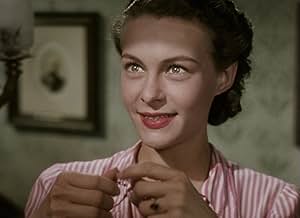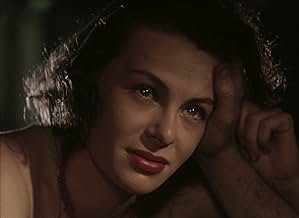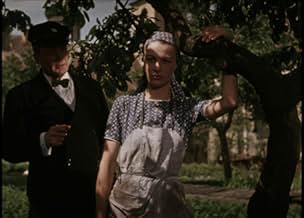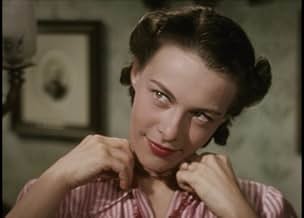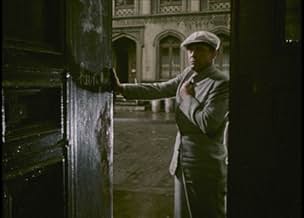L'histoire du "marin chanteur" Hannes Kröger qui travaille dans un club de St. Pauli sur la Große Freiheit 7, et tombe amoureux d'une fille. Mais elle lui préfère son rival Willem. Hannes se... Tout lireL'histoire du "marin chanteur" Hannes Kröger qui travaille dans un club de St. Pauli sur la Große Freiheit 7, et tombe amoureux d'une fille. Mais elle lui préfère son rival Willem. Hannes se tourne de nouveau vers la mer, pour oublier.L'histoire du "marin chanteur" Hannes Kröger qui travaille dans un club de St. Pauli sur la Große Freiheit 7, et tombe amoureux d'une fille. Mais elle lui préfère son rival Willem. Hannes se tourne de nouveau vers la mer, pour oublier.
- Réalisation
- Scénario
- Casting principal
Avis à la une
The bawdy, boozy, brawling sequences in the Grosse Freiheit no 7 of the title are well choreographed but for this viewer at any rate the film's effectiveness lies in the intimate scenes where Kautner's gift with actors comes into play. The performances of Albers, Ilse Werner(also teamed to great effect in 'Munchhausen') Hans Soehnker and Hilde Hildebrand are exemplary whilst the director puts on his actor's hat as Karl and fellow screenwriter Richard Nicholas does a turn as an ancient mariner. One of the film's obvious highlights is the magnificent nightmare sequence splendidly edited by Annaliese Schoennenbeck.
Kautner managed to navigate the perilous waters of National Socialism and refused to allow his films to be infused with Nazi ideology which naturally brought him into conflict with Herr Goebbels. Originally endorsed by the Propoganda Ministry as a tribute to the Merchant Navy, the finished film was deemed to be immoral, unheroic, demoralising and subversive. As a result it achieved the distinction of being one of ten films banned by Goebbels in 1944. As for Albers, he cleverly distanced himself from Nazi propoganda and as with the equally popular Heinz Ruemann, the Hitler regime turned a blind eye to his partner being Jewish.
Although perhaps not equal to the sum of its parts, Kautner's film with its melancholic strain continues to cast its spell and bears the hallmarks of a master film-maker. Shot in glorious Agfacolor by Werner Krien its songs undoubtedly contributed to its success, to the extent that outside Northern Europe Herr Albers is renowned more as a chanteur than the fine actor he was. As a son of Hamburg his statue still stands in the Platz named after him and he was to get more mileage out of the Hamburg connection with 'On the Reeperbahn at half past Midnight' and 'Heart of St. Pauli' in the late 1950's when he was, alas, well beyond his prime.
Kautner went on to become a beacon of light in the commercial wasteland of post-war German cinema.
"Grosse Freiheit Nr 7" was made during the last phase of World War Two, and the Nazi propaganda was hoping for an heroic movie. They were utterly disappointed by the film, which was not shown in Germany until after the Second World War. To recoup some of the production costs the film was nonetheless exported to other countries.
What exactly did arouse the resentment of the Nazi's? I think it was the sphere of melancholy ans nostalgia that permeates the film. Instead of an heroic seaman the film is about a retired sailor who earns a living by singing in a nightclub in the red light district of Hamburg.
In the beginning of the film two former ship mates are visiting his club. At the outside of the club they see their old fellow as a mechanically moved mannequin pop. At the inside the memory's of times gone by immediately set the tone.
This relationship between the old pals is more important for the ambiance of the film than all the romantic complications that are to follow. Complications that are nevertheless responsible for a magnificent dream sequence where our main character is torn apart between his love for the sea and his love for a girl he has recenly met.
From directing till script, from acting till (Agfa colour) photography this is a brilliant film, with everyone involved giving best of their talents. What we see is a compelling drama, well balanced, psychologically well conceived and at the same time a film that is great fun to watch over and over again. In this film there are only people and their lives who are not up to standard Nazi definition. There are also great songs, including the bitter "Beim ersten Mal tut's noch weh'", sung superbly by Hilde Hildebrandt.
There is one minor distraction: Käutner is beside the mark with the dream sequence, with which we could have done without. On the other hand, who cares: this film is made from the heart. With Romanze in Moll and Unter den Brücken this is the best of Helmut Käutner.
As usual for Kautner, the film employs a more mobile and freewheeling camera. Zooms and pans are used to convey shifts in relationships, for example when Gisa is talking to her mother just before leaving the farm.
Of particular note in this film is the dream sequence experienced by Hannes. Through this sequence Kautner explores the possibilities of manipulating colors, pushing the boundaries of the new technology. His use of form in this sequence is also worthy of discussion. The slanting angles and semi-realistic sets that he uses, especially when Hannes and Willem are fighting on the ship, are reminiscent of the German Impressionist films of three decades before. This application of an earlier film style is particularly well suited to the content of those scenes, as German expressionism was an attempt to externalize onto the environment the internal attitudes of the characters its modes and tropes lend themselves quite well to hallucinations and dream sequences.
In this film Kautner once again presents a sort of timeless, a political Germany. Even though the film was produced under the grip of one of the most brutal regimes in history, and was a thorn in the side of Joseph Goebbels, there are no traces of the political climate of the day, let alone anything resembling propaganda. The characters exist in a Germany that is modern and recognizable, but is clearly not the Germany that the audience knows. This feature of Kautner's films during the war years seems to have been an attempt to remind people of their essential humanity, even among the horrors of war and the domination of a brutal government.
Le saviez-vous
- AnecdotesBanned by the censorship of the third Reich because the film was considered too "anti-heroic" and demoralizing.
- Citations
Hannes Kroeger: [stolpert betrunken umher] Es gibt nichts, was ein Mann nicht vergessen kann...
[pause, lauter]
Hannes Kroeger: wenn er ein Mann ist!
- ConnexionsFeatured in Münchhausen - Ein Mythos in Agfacolor (2005)
- Bandes originalesAuf der Reeperbahn Nachts Um Halb Eins
Written by Ralph Arthur Roberts
Sung by Hans Albers, accompanied by Filmorchester directed by Werner Schmidt-Boelcke
Meilleurs choix
- How long is Great Freedom No. 7?Alimenté par Alexa
Détails
- Durée1 heure 51 minutes
- Mixage
- Rapport de forme
- 1.37 : 1
Contribuer à cette page


